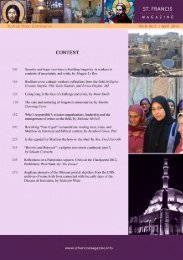download the pdf - St.Francis Magazine
download the pdf - St.Francis Magazine
download the pdf - St.Francis Magazine
Create successful ePaper yourself
Turn your PDF publications into a flip-book with our unique Google optimized e-Paper software.
<strong>St</strong> <strong>Francis</strong> <strong>Magazine</strong> Vol 8, No 4 | August 2012<br />
Melito of Sardis identified Jesus Christ as fully God and fully man<br />
in his writings around 177 AD: “Being God and likewise perfect<br />
man, he gave positive indications of his two natures: of his deity, by<br />
<strong>the</strong> miracles during <strong>the</strong> three years following after his baptism… he<br />
concealed <strong>the</strong> signs of his deity, although he was <strong>the</strong> true God existing<br />
before <strong>the</strong> ages” Anastasius of Sinai's, The Guide 13.<br />
A<strong>the</strong>nagoras wrote in 160 AD: “…<strong>the</strong>y [<strong>the</strong> Christians] hold <strong>the</strong><br />
Fa<strong>the</strong>r to be God, and <strong>the</strong> Son God, and <strong>the</strong> Holy Spirit, and declare<br />
<strong>the</strong>ir union and <strong>the</strong>ir distinction in order.” A Plea for <strong>the</strong> Christians<br />
10.3.<br />
Clement of Alexandria in 190 AD makes a strong case for Christ’s<br />
deity and <strong>the</strong> Trinity in several writings: “I understand nothing else<br />
than <strong>the</strong> Holy Trinity to be meant; for <strong>the</strong> third is <strong>the</strong> Holy Spirit,<br />
and <strong>the</strong> Son is <strong>the</strong> second, by whom all things were made according<br />
to <strong>the</strong> will of <strong>the</strong> Fa<strong>the</strong>r.” <strong>St</strong>romata, Book 5, ch. 14. “This Word,<br />
<strong>the</strong>n, <strong>the</strong> Christ, <strong>the</strong> cause of both our being at first (for He was in<br />
God) and of our well-being, this very Word has now appeared as<br />
man, He alone being both, both God and man.” Exhortation to <strong>the</strong><br />
Hea<strong>the</strong>n, ch 2<br />
Alexander of Alexandria (died 326 AD) wrote:<br />
Thus concerning this, we believe--as it seems best to <strong>the</strong> apostolic<br />
church--in one unbegotten Fa<strong>the</strong>r, who of his being has no cause, who<br />
is immutable and unchangeable, always according to <strong>the</strong> same things in<br />
<strong>the</strong> same state, nei<strong>the</strong>r receiving progress nor diminution, who is giver<br />
of <strong>the</strong> Law, Prophets, and Gospels, who is Lord of patriarchs, apostles,<br />
and all <strong>the</strong> saints; and in one Lord Jesus Christ <strong>the</strong> only-begotten Son<br />
of God, begotten not from nothing but from <strong>the</strong> Fa<strong>the</strong>r who is, not according<br />
to <strong>the</strong> likenesses of bodies by dissections or emanations from<br />
divisions, as it appears to Sabellius and Valentinus, but inexplicably and<br />
indescribably, according to him who said, as we set forth above, 'Who<br />
will describe his generation' (Isa. 53:8). Letter to Alexander of Thessalonica,<br />
46<br />
Those confessions of faith were never mere <strong>the</strong>oretical writings,<br />
but were also repeated and recited throughout <strong>the</strong> liturgies for baptism<br />
and <strong>the</strong> Eucharist. The oldest Coptic baptismal formula says:<br />
<strong>St</strong> <strong>Francis</strong> <strong>Magazine</strong> is a publication of Interserve and Arab Vision 447







![Reflections on Surah Fatiha and the Lord's Prayer[1] - St.Francis ...](https://img.yumpu.com/49377951/1/184x260/reflections-on-surah-fatiha-and-the-lords-prayer1-stfrancis-.jpg?quality=85)









